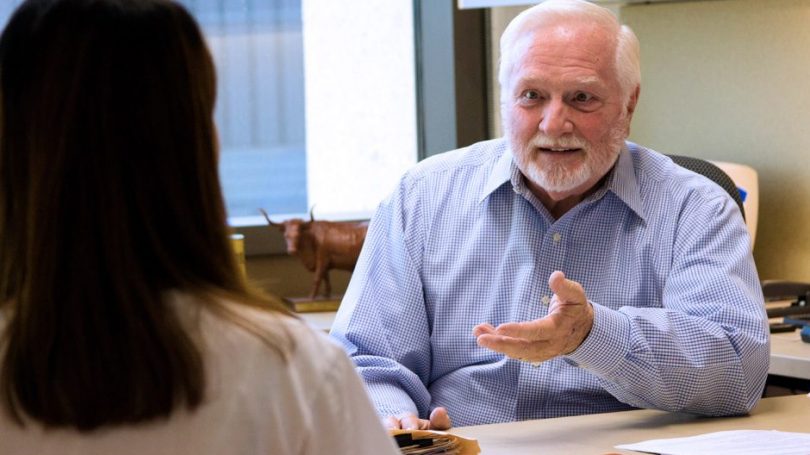“Hemeyerisms” for Staying Relevant in Your Career

If you look at the trajectory of a career, what does it mean to stay relevant? Relevance, defined as, “closely connected or appropriate to the matter at hand,” sounds easy enough to achieve. All you have to do is establish that connection and congratulations! You’re relevant…for now.
Here’s the rub: that “matter of hand” part? The trend, technology or skill set you’re connecting to? It’s constantly evolving. And in the worlds of public relations and marketing communications, it evolves like wildfire.
Pierpont’s Executive Counsel, Terry Hemeyer, knows more than a thing or two about staying relevant throughout a career. Throughout the last five decades, Hemeyer’s roles have included Air Force officer, c-suite executive for a Fortune 500 company and crisis manager—and he’s seen everything from the rise of satellite technology to Snapchat. In fact, when Hemeyer was just starting out, NASA put man on the moon using less processing power than that of the smartphone in your pocket.
Yet, it’s not just Hemeyer’s resume that’s kept him relevant. He’s intentionally kept a pulse on the evolving world around him right from the source: the next generation of students. As a professor at the University of Texas at Austin’s Moody College of Communication, Hemeyer is known for his one-liner pearls of wisdom (lovingly called “Hemeyerisms” here at Pierpont) about staying relevant throughout your career.

Be Well-Rounded
There’s a growing school of thought that establishing niche expertise is necessary to success, or that a vertical move always bests a lateral one. However, rushing into specialization without also striving for a well-rounded foundation of various industries or skill sets can backfire on you, pigeonholing you into a specific role and preventing ascension into executive roles.
“If there’s one problem we have today in PR, it’s that we’re not growing our own,” Hemeyer said. “More and more of today’s chief marketing officers and chief communications officers are not coming from a PR background. They’re coming from legal, HR, finance and marketing. That’s a problem for us.”
More than once, Hemeyer has seen fellow PR professionals hit a ceiling because they have only specialized in one practice area throughout their career. He advises entry-level PR practitioners to proactively learn different skills and seek out new challenges to diversify their opportunities for future growth.
“Make sure you’re handling different things for clients, not just media relations, deployed communications or events,” he added. “Get out of your cubicle. Once you become good at something, people will want to keep you in that space. Don’t let that happen.”
Learn from Everyone
In the same vein as being well rounded, often the most successful professionals are those who intentionally surround themselves with, and seek to learn from, other subject matter experts. After all, in our connected worlds, no one is an island unto themselves.
Hemeyer encourages professionals to take a collaborative approach to solving problems, as well as being willing to learn from everyone around you—even people who might be less experienced.
“Every day in my life I have learned something new, and I expect to continue that,” he added. “I learn more from my students than they learn from me. It’s a two-way street. I could never keep up with all of the latest trends if it wasn’t for them.”
Even if you don’t know the answer at first, Hemeyer warns not to let this deter you from tackling new problems or opportunities head on. “In our industry, you have to jump in as an expert. When you’re faced with a new challenge, find a subject matter expert and align yourself with them. Share your problem and come up with an answer together. You’ll figure it out—I believe there’s nothing that can’t be solved.”
“Fail Fast”
One of my favorite phrases in writing is “kill your darlings.” It’s the idea of not being afraid to delete a passage or omit a character that doesn’t work, no matter how much you love it. The same idea could apply in the corporate world but, as Hemeyer has observed, far too many lack the courage to pull the plug and fail fast when a project (or even a job) isn’t working out.
“If you’re going down the wrong road, you better stop at the turn. Too often, companies get a big project and give it a big budget. When it doesn’t work, they just keep pouring more and more time and money into it, oftentimes because their ego gets in the way of letting go of the project. This almost always leads to a bigger failure and greater challenges down the road,” Hemeyer added.
Never Settle
The most obvious, and yet most underutilized, key to staying relevant is a resolve to never settle. When success is achieved and goals are finally reached, it can be tempting to want to coast in your career—at least for a little bit—and just enjoy your successes. But before you know it, comfort becomes complacency (remember that whole “matter of hand” conversation?).
“I don’t care how successful you are. If you relax, you will get passed by,” Hemeyer added. “People say ‘if it ain’t broke, don’t fix it’, but I don’t believe that. There is nothing that cannot be improved upon and you have to challenge yourself to get better.”
Even with five decades of experience under his belt, Hemeyer’s clearly not one for resting on his laurels. His final word of advice?
“Be fearless and aggressive. Seek out opportunities, and more will come to you.”
Contact Us